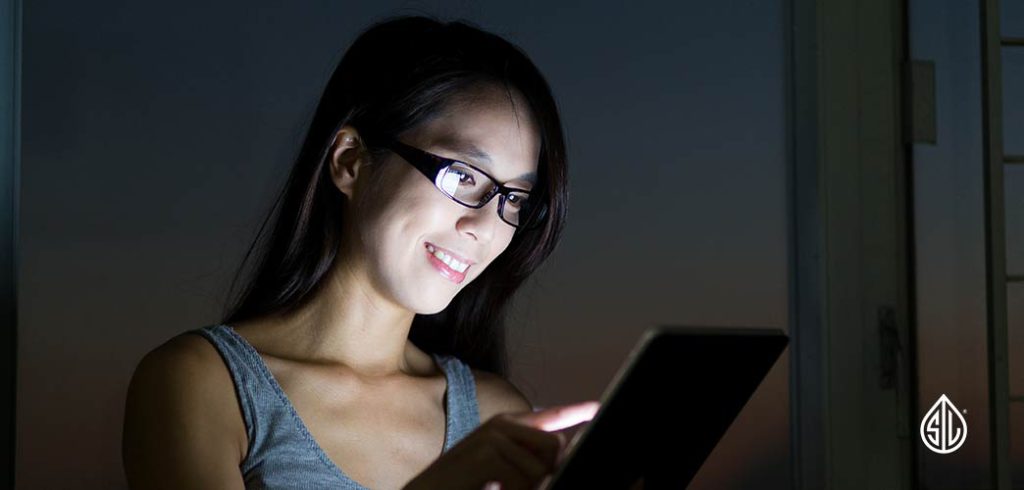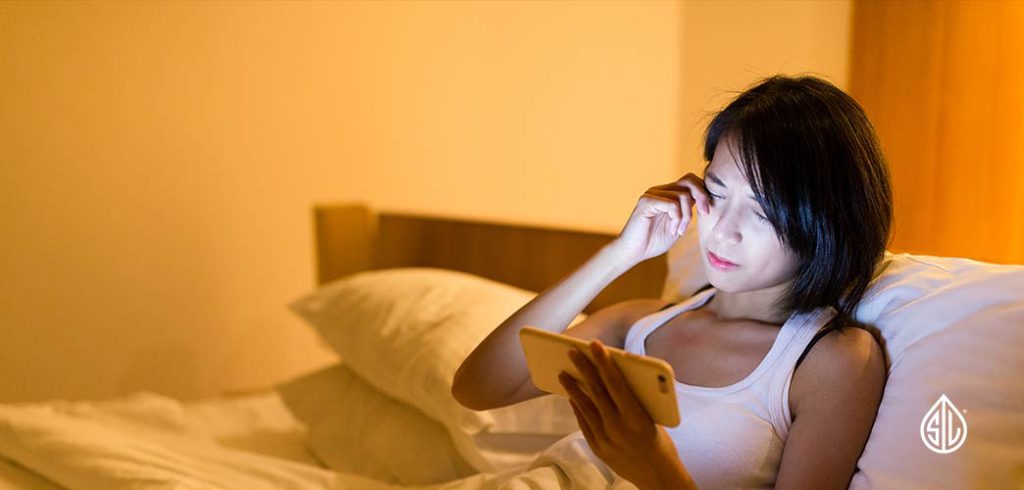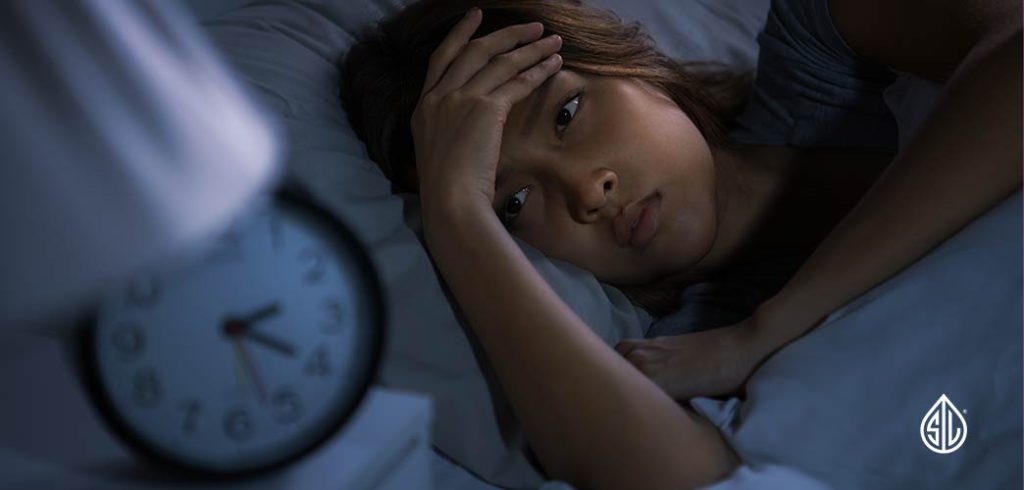How Does Blue Light Affect Sleep?
What is blue light? Learn about the effects blue light has on your sleep and more.
January 20, 2022

Simple Leaf Staff
Blue light plays a big role in setting our bodies’ circadian rhythms. Here’s when to soak it in and when to avoid it for dreamier sleep and more energetic days. – Yes, research suggests blue light from your phone, fluorescent lights, and other screens can interfere with sleep.
Blue light is emitted from our smartphones, computer screens, televisions, the fluorescent lights in the office, tablets, video games, to the LED lights that keep you from walking into a wall when it’s dark out, and even the sun. Blue light is all around us all day long. And sleep experts want you to know that yes, exposure to blue light during the day does affect your sleep. Blue light is a necessary evil in today’s society. It’s literally EVERYWHERE! You’re looking at it right now. It’s been a technological game-changer with how we live our lives.
BUT, there’s good news/bad news with anything. While the advent of blue light has no doubt improved our overall quality of life, there’s also a downside. Blue light has been shown to suppress the body’s natural melatonin production. A 2020 Harvard Medical article, discusses the impact of prolonged (blue) light exposure and how it negatively impacts the natural production of melatonin and the interruption of the body’s natural circadian rhythm (your body’s internal 24-hour clock).
WHAT IS BLUE LIGHT?
Blue light is part of the visible light spectrum. Essentially, what the human eye can see. Vibrating within the 380 to 500 nanometer range, it has the shortest wavelength and highest energy. About one-third of all visible light is considered high-energy visible, or “blue,” light. Sunlight is the most significant source of blue light. Artificial sources of blue light include fluorescent light, compact fluorescent light (CFL) bulbs, LEDs, flat screen LED televisions, computer monitors, smart phones and tablet screens.

ARE THERE ANY HEALTH BENEFITS TO BLUE LIGHT?
THE COLORS OF LIGHT AFFECT THE CIRCADIAN RHYTHMS
- BLUE LIGHT has the strongest impact. Exposure to blue light (and white light, which contains blue light) during the sensitive period can make it difficult for you to fall asleep and stay asleep.
- WHITE LIGHT exposure during the day can have positive effects, including boosting alertness and mood.
- RED LIGHT has no effect on the circadian clock, so you can use a dim red light at night.
- YELLOW LIGHT and ORANGE LIGHT have little effect on the clock so you can use a very dim yellow or orange light at night.
Blue light waves come from fluorescent and LED lights and back-lit electronic screens on televisions, computers, tablets, and cell phones. Remember, exposure to these lighted screens during the sensitive period can make it difficult for you to fall asleep at night or can wake you up too early. Especially if you are having trouble with sleep, avoid these lights during the sensitive period.

WHAT DEVICES GIVE OFF BLUE LIGHT?
Many people work under artificial lights and are constantly interacting with the screens of electronic devices. It’s understandable to want to know which of these sources emit blue light.
Common sources of blue light include:
- Smartphones
- Tablets
- E-readers
- Computer screens
- Televisions
- Fluorescent lights
- Lightbulbs
- LED lights
- Video game consoles
CAN e-BOOKS AT BEDTIME AFFECT SLEEP QUALITY?
During a two-week inpatient study, 12 participants read e-books on a light-emitting iPad for four hours before bedtime each night for five consecutive nights and followed the same regimen with printed books. Researchers found that participants reading on an iPad took longer to fall asleep and spent less time in REM sleep; had reduced secretion of melatonin, a hormone that normally rises in the evening and plays a role in inducing sleepiness; had a delayed circadian rhythm of more than an hour; were less sleepy before bedtime, and were sleepier and less alert the following morning.
This preliminary research supports previous studies demonstrating blue light’s adverse effects on sleep-related processes. Poor-quality sleep, in turn, can have a significant impact on physical health, including an increased risk of heart disease, diabetes, obesity, and certain cancers.

WHAT IS MELATONIN?
Melatonin is a natural hormone that plays a role in your sleep-wake cycle. It is synthesized mainly by the pineal gland located in the brain. The production and release of melatonin in the brain are connected to the time of day, increasing when it’s dark and decreasing when it’s light. Natural melatonin levels typically rise between 2-3 hours before you go to bed. That’s what gives you the sleepy feeling before bed. Melatonin production also declines with age.
While this all sounds super depressing, right? The good news is that the risks of nighttime blue light exposure can be reduced through relatively simple and fast methods.
WAYS TO MITIGATE MELATONIN SUPPRESSION:
Blue Light blocking glasses
Blue light glasses can help reduce eye strain. Blue light can make it difficult to focus on the screen, making your eyes strain to concentrate. Blue light glasses help increase contrast on your screen, making it easier to focus and subsequently reduce eye strain.
Cut back on screen time 2-3 hours before bed
Because natural melatonin levels start to rise 2-3 hours prior to bedtime, reducing blue light exposure during that time will help prevent the adverse effects of blue light on natural melatonin production.
Install blue light filtering apps
Blue light filters for your smartphone, tablet, and computer screens prevent much blue light from these devices from reaching the eyes without affecting the visibility of the display.
Daytime exposure to light
Expose yourself to lots of bright light during the day, which will boost your ability to sleep at night, as well as your mood and alertness during daylight.
Supplement for Melatonin deficiencies
Evidence suggests that melatonin supplements promote sleep and are safe for regular use. Melatonin can be used to treat delayed sleep phase and circadian rhythm sleep disorders in the blind and provide some insomnia relief. Treat melatonin as you would any sleeping pill and use it under your doctor’s supervision.
Natural Sleep Supplements
When you’re not able to get a good night’s rest, every aspect of your life can be negatively impacted. For short-term insomnia, jet lag, or melatonin deficiencies, medical professionals may recommend natural sleep aid supplements. Simple Leaf’s Sleep Support CBD capsules are a powerful sleep aid that contains organic CBD, Melatonin, Ashwagandha, and Chamomile to help you catch more Zzz’s and wake up feeling fresh. Take a look at our CBD Sleep Support and see why it is a top-selling sleep formula. If you decide you want to try it, use code SLEEP15 for $15.00 off your first bottle.
